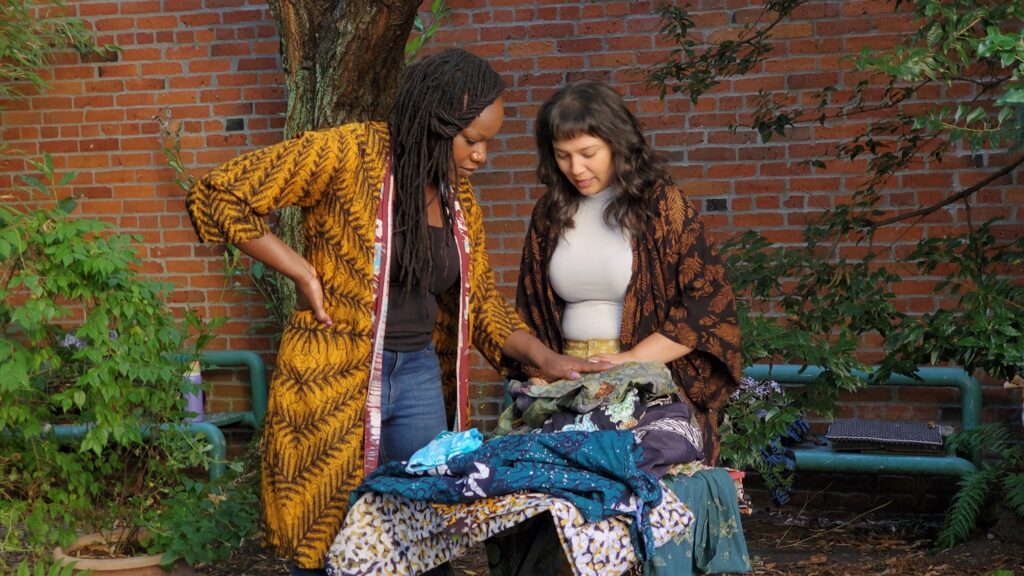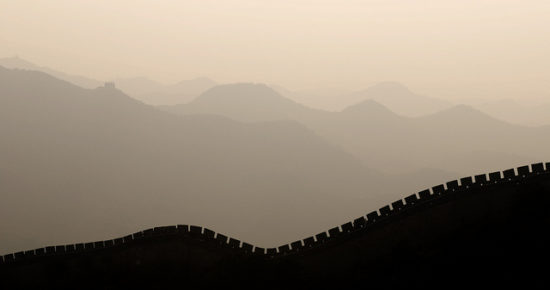I am no longer striving to understand something foreign, or to earn some measure of acceptance or belonging that I don’t deserve. I am here, simply, to see the land that my family came from, to know that we have been here before.
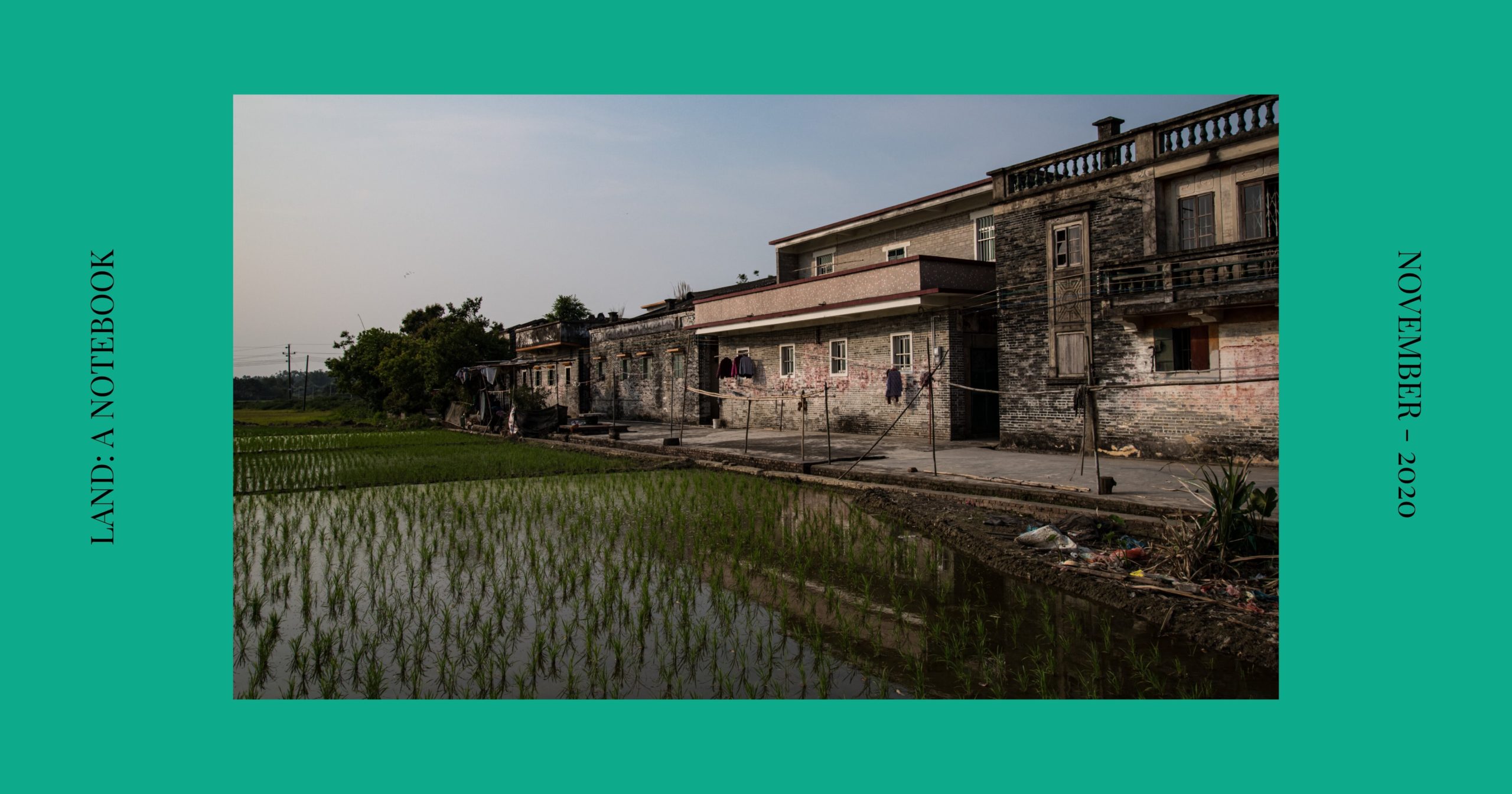
On an overcast Thursday morning in October 2019, I woke up in my Brooklyn apartment to a flurry of messages from a relative in China.
[hand wave emoji]
hi! are you here
i have something to ask you for help
I sat up in bed and opened my iPhone. The messages were from Duncan, a distant cousin, you might say, whom I’ve never met. But I knew his family as the custodians of my grandma’s ancestral home in China.
The last time anyone in our immediate family had lived there was three-quarters of a century ago. Lately, though, the younger generations had been wont to show up in the village unannounced. My aunt and her family were the first to venture out into the unmarked roads of the Toisanese countryside with the help of an older relative who knew the way; Grandma went with them and made her one and only return visit in the early aughts. My cousins made subsequent trips to Sam Bat during their study abroad terms in China, and I, finally, had managed to squeeze in a short visit in the spring of 2018.
Now, a year and a half later, I received this message:
The old house you visited has to be demolished, because of the highway, the rural house must be demolished.
Duncan’s English, like my Chinese, had none of the honeyed graces of a native speaker. He lacked the delicate vocabulary to soften the blow of bad news. The old house must be demolished. He’d said it twice, as if to make certain there would be no misunderstandings.
* * *
For many years, I tried to understand what it meant that my maternal grandparents came from China.
On my father’s side, the Irish side, the fact of my ancestors’ migration was easier for me to visualize. When I thought of Ireland, I saw waves crashing on dramatic sea cliffs and rolling green meadowland dotted with sheep. The Irish Potato Famine was a well-known story in the American history textbooks of my youth. My dad liked to repeat an apocryphal tale about some great-great-grandfather who was orphaned as a boy during the Great Hunger and walked across the whole of Ireland before boarding a ship to New York.
When I thought of China, my imagination faltered—the screen just went black. My head had already been filled with Western ideas about it. China was a place that seemed impossible to get to, so alien, the only logical way there was digging a hole through the center of the Earth.
Even after I made my first trip to China and acquired the sensory experience of its placeness, I struggled to reconcile the China of today with the one my family had left behind. Later, when I studied Mandarin in college and actually learned a thing or two about East Asia, my wonder only increased. It seemed as though my great-grandparents and grandparents’ journeys were each tenuously conceived of a million different transactions that could have gone wrong: How did they afford the expensive boat tickets? Were they detained by US immigration on arrival? What if they had stayed until the Communists took over?
During college I traveled to many places in China, but never to where we were from—Guangdong in the South, a region that remained distinct in my mind. I longed to see it for myself, yet I inexplicably avoided making plans. To travel there would be to travel into the past, a daunting journey for those who lived it, but perhaps more so for those who merely grew up hearing stories of it. Like walking through the wardrobe and into Narnia, I was apprehensive of what I might find. Aunt Terry once recounted one of Grandma’s memories from the war. In the darkness of night, she saw a giant fireball erupt in the sky. Decades later Grandma’s words still failed her. She did not know what it was, only that it terrified her.
* * *
The region of Toisan is organized into forty or fifty market towns, which are in turn made up of smaller villages. Sam Bat Wei, or 38 Market, is so named because its country market assembles on days with a three or eight in the date, i.e. September 3, 8, 13, 18, 23, and so on. Technically, Sam Bat is not the name of Grandma’s village, but for my American brain that gets foggy at the slightest mention of the confusing system that governs China’s geography, it has become the easiest shorthand for referring to it. Grandma had written down her village address in Chinese characters and identified its location through the hierarchy of province, city, marketplace, village, and hamlet. I transferred the scanned image of her notes, with its familiar loping handwriting, to my phone. It was my key back to Sam Bat. Most people in Toisan City proper, by Chinese standards a “small town” with about a million inhabitants, had no idea how to get to the backwoods market towns.
In contrast, Guangzhou is an exemplar of Asian modernity. The fifth largest city in China with a population approaching 15 million (nearly twice the size of New York City), it sits at the nexus of the Pearl River Delta. After I arrived in Guangzhou in April 2018, I walked up and down the river promenade where pleasure boats, futuristic bridges, and skyscrapers tricked out with LEDs lit up an overcast evening sky.
Then one morning, two days before the Qingming Festival was set to begin, I left my Airbnb in Guangzhou and descended into the subway. The holiday furor was already underway as crowds surged through the subway exits and into the bus terminal, where I finally arrived after an hour and forty minutes. Somehow I made it through the long lines and bought a bus ticket to Toisan with two minutes to spare before the departure time. I sprinted to the gate and sighed with relief when I sat down in my assigned seat at the rear of the bus, sweat streaming down my back, damp bangs pasted to my forehead.
About two hours in and nearing the end of my bus journey, I surveyed the outskirts of Toisan: fields as far as the eye could see, top-heavy farm houses that appeared to have outgrown their once-simple designs, the occasional construction site or mining venture, and an endless, tar black highway outstretched ahead and behind, the only through line connecting them all.
I disembarked at the central bus station in Toisan and hailed a taxi. The driver shrugged me off when he couldn’t find my hotel and instead dropped me off at a maze-like private housing complex. After someone in the housing office kindly walked me down the street—I felt sheepishly like the predictable foreign laowai in distress—I checked in at my hotel and asked the clerk whether she could find me a driver.
A flurry of WeChat messages ensued, the hotel wifi cutting in and out on my useless American phone with no data or cell service, as I dropped my bags in the room and got lunch next door. Like a dutiful older sister or overprotective auntie, the hotel clerk peppered me with questions: Had I ever met these relatives before? Did I even know if they were alive? If I didn’t have phone service, what would I do if I got lost or was in danger? Perhaps I could make plans to visit another time?
The problem was this was my only day in Toisan. Yes, I had planned very poorly. But I remained resolute in the face of the hotel clerk’s very practical objections. Maybe I would get lost. Maybe I wouldn’t be able to find the house, or I’d discover that it was long abandoned. But I had come this far. There was no way I was going to back down now.
She made the call to a friend who agreed to drive me for 200 RMB (about $29 USD) and within minutes a red sports car pulled up to the hotel driveway. I got in and we were off. The driver and I made small talk on the way. He was curious how someone like me could trace her origins back to Toisan. When I explained that it was my great-grandfather and his father before him that were the first in my family to leave China for the US more than a hundred years ago, he responded with awe: “Waaa…hao jiu.” So long ago.
I was surprised at the driver’s surprise. Poverty, warlordism, and general instability in 19th century China drove many desperate young men in Toisan, initially spurred by the California Gold Rush, to pursue their fortunes across the ocean in America. Up until 1965, more than half of all Chinese Americans could chart their origins to this rural farmland. Even today, Toisanese heritage is common among families that have been in the US for several generations. The idea that this might have been forgotten by the very people we came from was unexpected. But then again, they were the ones we left behind.
Nearing our destination half an hour later, the driver pulled over to ask for directions. We followed a shopkeeper’s instructions onto a narrow street that cut off from the main highway through a Chinese gate, then snaked past small clusters of houses every few hundred yards. There were no signs, and soon we were lost.
Catching sight of a group of elderly villagers playing mahjong in the afternoon sunshine, the driver pulled up to their roadside party. With my cell phone in hand, he showed them my Grandma’s handwritten address, as well as a picture of my cousin inside the house next to the family shrine.
“I know that place,” one of them said and pointed. “It’s just down that way.”
We drove a few minutes more and then stopped. The driver got out and went inside a blue brick house to inquire. I sat in the car, alone, anxiously waiting in disbelief. Could this really be it? The place I had tried to imagine so many times? A place, I knew in all likelihood, no longer existed? I held my breath.
The driver came back outside, followed by a middle-aged woman. She smiled and waved hello. This was it. The house was still here. Miraculously, I had arrived at my ancestors’ doorstep.
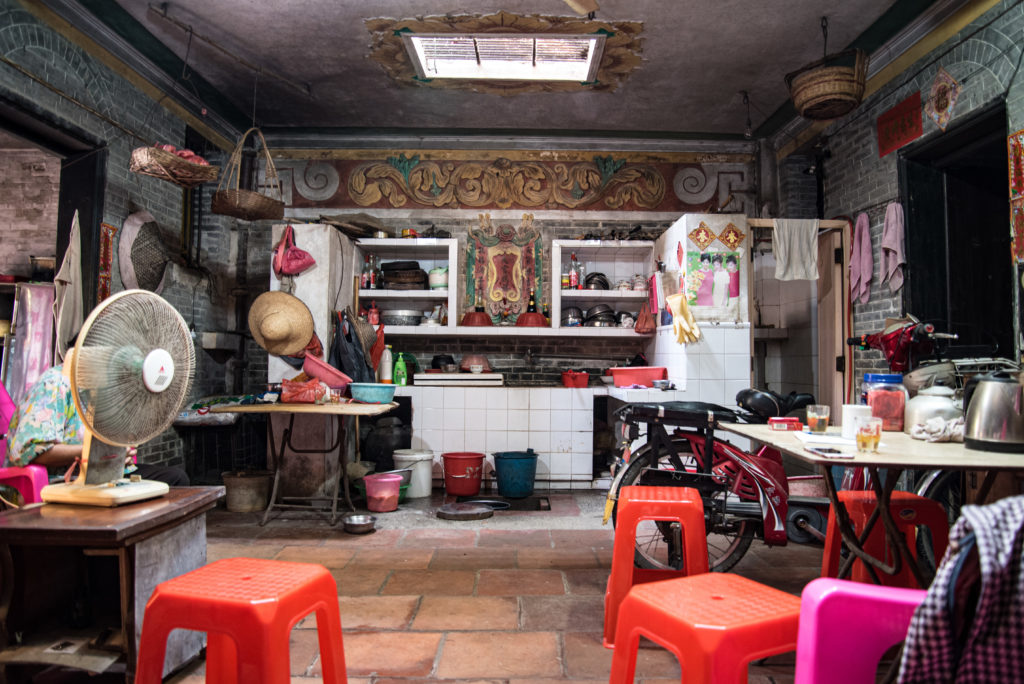
* * *
We sat on red plastic chairs and sipped hot tea from small glass cups even though it was 85 degrees outside. Inside the brick house where my grandma spent her childhood, it was dark and cool. An old man with a smoker’s rasp, who must have heard the commotion of a stranger arriving in the village, stopped by to chat with my relatives in Toisanese, a variant of Cantonese, a dialect of a dialect, a language I don’t understand. The life he had led was written on his face, expressed in the contours of his taut, leathery skin, in the dirt beneath his fingernails. A stark contrast to Grandma, who I imagined back in Southern California, resting outside in her garden and popping cherry tomatoes into her mouth like candy. The man said he remembered her; my grandma would have been just a girl when she left the village.
Ann Yee was twelve, in fact, when she left Sam Bat in 1946. The war had ended and her father, my great-grandfather, Gilbert Yee, who had been working in America with his father since he was seven years old, shrewdly enlisted in the U.S. Army in exchange for the promise of citizenship when World War II broke out. It had been six tense years of war and its aftermath, of Japanese troops storming the village, leaving wanton destruction and violence in their wake, followed by vengeful Chinese troops returning to punish villagers branded Japanese sympathizers.
Grandma, her mother, and brother Jimmy made the journey to America by ship, embarking from Hong Kong, with stops in Shanghai and Hawaii as they made their way across the Pacific. Her face lit up, as if she were that twelve-year-old girl again, when she recalled watching the dancing hula girls welcome passengers at the port in Honolulu.
In San Francisco, their final destination, mother and children were held in a detention center for two days. U.S. immigration officers were known for putting Chinese immigrants through the ringer. Rigorous questioning about esoteric details, like how many steps were between their front door and the village well, could go on for weeks or even months.
The reason her family was released so quickly, Grandma said, was because her father had documented two children, a daughter, the eldest, and a son. The immigration officers reasoned that any Chinese man who listed a daughter as his first child—a valuable slot that could have been sold off as papers for a boy—must be telling the truth.
Seventy years later, I had made Grandma’s journey in reverse. Despite the day’s difficulties, I knew I’d had it easy by comparison.
* * *
The week after I learned the news about Grandma’s house, I railed against the Chinese government and their ruthless efficiency to anyone who would listen. I posted about our family’s predicament on a Facebook group for “those who trace their roots to Hoisan” and the comments streamed in. Many offered condolences and shared similar experiences. “My family is also going thru [sic] the demolition as well!” one poster commiserated. “How could they just blow down the house,” another wrote.
Others offered possible explanations for the government’s sudden decree. A number of high-speed railway projects were underway in the region. There were also plans to build an airport in Toisan. Or it could be part of Xi Jinping’s greater “beautiful countryside” campaign to “assist” rural areas by overhauling decrepit or abandoned villages and rebuilding “a pleasant living environment to increase the sense of gain and happiness of all rural residents.”
Regardless the reason, I had to come to terms with reality. There would be no petitions, no town halls, no sit-ins to protest or block the demolition. Once a building is marked chai, the dreaded Chinese word signifying demolition, the decision is final. The CCP does not negotiate.
I was upset, but I knew that mourning the house from afar was a privilege of having left the village long ago; it was not an asset or shelter that we were losing, but a memory. Our relatives would be turned out and homeless. Their family had cared for the house all those years; it was theirs in every way except on paper.
My cousin Philipp and I came up with an action plan. He worked with Uncle Jim on the paperwork to transfer the deed to our relatives (as a daughter who married into another family, Grandma no longer had any claim to the property), so that they would be compensated by the Chinese government. This was something I’d also heard other Toisanese Americans do.
I volunteered to call Grandma. But I stuttered into the phone when she answered. She’s hard of hearing, and even with her good ear pressed against the receiver, she couldn’t understand my words garbled by anxiety and grief. I emailed one of my aunts instead who delivered the news in person. Grandma and I haven’t talked about it since. I don’t know if she grieved the loss of the house, and I’m wary of dredging up those feelings a second time.
Though it’s likely she also felt relief. Grandma has no desire to return to China, a place that haunts her memories. Once, while I was studying abroad in Shanghai, she called my parents in the middle of the night and left a frantic voicemail asking whether I was safe. She had a bad dream, a flashback, perhaps, to the days when the Japanese tramped through the village and she and her brother were sent to hide in the fields.
But there were good memories too. At three years old, Grandma recalled with pride, she watched her father and a local builder go over the plans for their new home in Sam Bat. The hardship of being thousands of miles apart for years-long stretches had paid off. That house was the fruition of a dream, one that immigrants the world over keep tucked away in their hearts when they make the perilous, uncertain journey to America. It wasn’t just a house but a home to keep their family safe, someplace where they would be nourished and protected, where they could laugh and grow together. Others took notice of the wonderful things money from America could provide. Grandma and Jimmy became known as the kids who rode a tricycle down the dusty village roads.
Today Sam Bat has emptied out. As far as I can tell, its inhabitants are mostly middle-aged empty nesters, the elderly, and occasionally young children who have been left in the care of grandparents.
Duncan, a twenty-something who himself lives and works in Shenzhen, one of China’s booming special economic zones, couldn’t tell me when the house would be knocked down, only that it would happen soon. Months passed before I worked up the nerve to ask him if it was done. Then, in a matter of seconds, I received several photos over WeChat. There, clear as day, was an aerial shot of the house, now roofless in mid-demolition, its carefully hewn walls reduced to a pile of rubble.
I asked Duncan if he felt sad. “It’s painful,” he messaged back, “I feel like I don’t have a place to belong to anymore.”
* * *
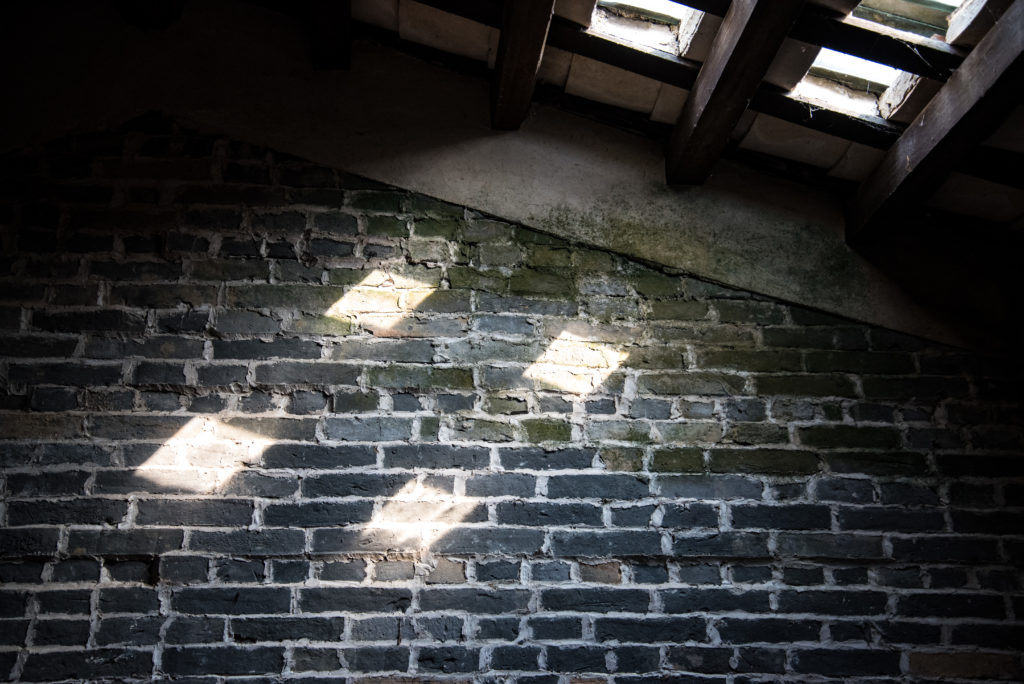
Sometimes I like to imagine I’m back there on that April afternoon in Sam Bat. The second brother, who has come to translate from Toisanese into heavily accented Mandarin, is just arriving. Unlike his older brother, who lets his wife do the talking, he is a cheerful and loquacious host. We’ve been referring to him and his brother as relatives, and while they share the Yee family name, they’re not exactly blood relations. I ask him to remind me how our families are intertwined. Without skipping a beat, he begins scribbling a list of names on a scrap of paper, but I can barely make out his Chinese scrawl. I ask if he can type them into his phone instead, where I can decipher the characters using an app. He smiles and says he doesn’t know how to use his phone. We sit hopelessly divided by gulfs of generation, language, and technology.
He asks me if we have Chinese food in America. I answer emphatically—not only do we have Chinese food, we have all different kinds, from regions like Sichuan, Hunan, and Yunnan. We have dishes that are almost as authentic as what you have here, in China. He nods, pondering the likelihood.
I ask if it’s okay for me to take a few pictures. His face immediately brightens. He ushers me around the house, throwing the doors open to every room—rooms that probably haven’t been entered in months, maybe years. They are mostly filled with cobwebs and junk: old suitcases from the 1950s, wire hangers bent out of shape, cardboard boxes that once held new appliances. I’m beginning to think we really are blood relations. The hoarding tendencies on display look strikingly similar to my parents’ garage.
Back in the kitchen, I notice a plastic jar labeled “Kirkland mixed nuts” that has been repurposed to store kitchen odds and ends; undoubtedly a gift brought by my aunt and cousins the first time they visited the village more than fifteen years ago. Chinese pop stars from old calendars are plastered on the wall—material culture made into decor. It’s like Grandma’s house in Highland Park wallpapered with photographs of grandchildren, National Geographic calendars, and an advertisement for a prime rib dinner (her favorite).
We continue our tour outside and walk past the strip of five or six squat houses made of dark brick that constitute the entire village. It’s just one of the many villages I can see all around us, spread out between planes of water, connected by meandering roads.
Grandma’s village is alive with plants and animals to tend to: chickens, ducks, pigs, packs of dogs, and fields of crops. Perhaps my family never really left the farm. Maybe that’s why the Highland Park house was always replete with fruit trees. Why Mom and her siblings received baby chicks one year, not realizing they’d all grow into roosters and turn the backyard into a pecking war zone.
Then there are the rice paddies. I’ve come at the right time, when the seeds are just beginning to sprout. I snap several photos, while two neighbors sitting in the shade look on.
“Hou lang ah?” It’s beautiful, isn’t it? an old woman says to me. Now I know I’m a tourist, taking pictures of something she has seen a thousand times before: a man seeding the flooded rice fields as the afternoon sun glints off the water.
“Hou lang,” I agree.
This is my first trip to China in eleven years. It is also the first time I have felt at ease here, felt the kind of repose that comes only with age and knowing who you are. I am no longer striving to understand something foreign, or to earn some measure of acceptance or belonging that I don’t deserve. I am here, simply, to see the land that my family came from, to know that we have been here before. To soak it up and then to return to the home I’ve always known in America.
In Sam Bat, the dogs in every hamlet, including the one that now lives in my grandma’s house, affirm this notion. They hate me.
“Gou gou,” I coo at them. They growl and bark and narrow their eyes at me, even from a distance of 10 yards. It’s almost comical. Because I know they know. I’m a stranger here.
The sun has dropped low in the sky and I remind the brothers of my invitation to dinner. The older brother and his wife get on one scooter, and the second brother takes me on the back of his. We put-put down the road to town, past the houses and rice fields and trash heaps.
At the restaurant, I tell them to order whatever they want. But as dishes begin to fill up the lazy susan, an unexpected queasiness washes over me. I pick at a few dishes. One I can only identify as globes of chewy animal fat, the other is most certainly tripe. I hate being the stereotypical guilo, so I politely stick to picking out vegetables and shoveling rice into my mouth, hoping no one will notice.
The second brother turns to me and asks, “Do they have food like this in America?” I shake my head no and his eyes crinkle up into a smile.
At least it feels good to play the generous American relative and have no one stop me when I reach to pay the bill, all 47 dollars of it. A round of satisfied burping and toothpicking commences, a signal that the meal is over. I call the driver.
When he arrives, I get in the passenger seat and roll down the window so that everyone can exchange goodbyes in the cool night air. My relative tells me to come back soon and next time to bring my boyfriend and my parents, “Bring everyone,” he says. I wave as we pull away, realizing that I don’t know his name.


